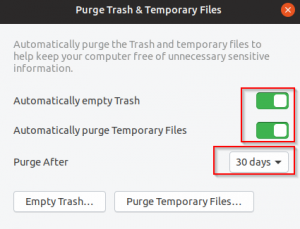


Although it is the most widely used command for this purpose, it is not the optimal way to do so. The rm command in Linux is used to remove files and folders from the system. The rm command – The brutal way of deletion Since we are using the Ubuntu command line application, the Terminal, you can open it either through the system Dash or the Ctrl+Alt+T shortcut. We have run the commands and procedures mentioned in this article on an Ubuntu 18.04 LTS system.
#Ubuntu empty trash install
In this article, we will explain a few ways to safely remove files through the Ubuntu command line and also install a Trash CLI so that files can be recovered if we have deleted them by mistake. However, file deletion is especially a sensitive operation in the Linux command line. In the graphical interface, things are pretty much visible and there is also the Trashcan utility to recover deleted files. Or, it happens that we intend to delete only files from a folder but mistakenly delete files from the subfolders as well. Unfortunately, there are instances when we delete something by mistake and there is no way to recover it. We tend to be cautious while deleting files, especially when deleting them permanently, as we do not want to mistakenly lose useful information forever.

As a Linux user, you may need to delete files from your system from time to time.


 0 kommentar(er)
0 kommentar(er)
